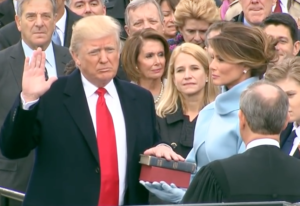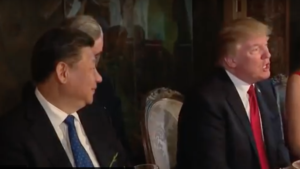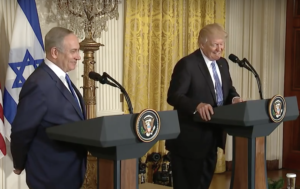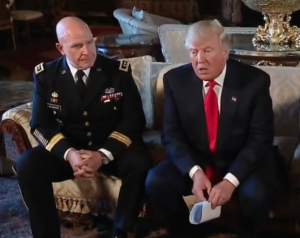Donald Trump’s Failing Presidency

He now appears to be little more than a traditional Republican with more than a little dash of Kardashian sleaze in him, a boorish reality-TV star reading from a neocon script that could have been written for many of his GOP rivals, except he delivers his lines with worse grammar and a limited vocabulary, favoring imprecise words such as “beautiful” and “sad.”
Trump also has the look of a conman. He sold himself as a populist who would fight for the forgotten Americans, but is following domestic policies aimed at comforting his super-rich friends while afflicting his most loyal blue-collar supporters.
He promises a tax package that will give huge breaks to the already well-to-do; he backed a Republican health-care plan that would have left 24 million Americans without insurance but saved billions for billionaires; he shows no sign of delivering on his trillion-dollar infrastructure plan although he keeps pushing his “beautiful” wall across the entire border with Mexico; and his hectoring of U.S. companies to stop exporting jobs has been more show than substance.
On the foreign policy front, Trump has broken his vow to move away from endless war and needless confrontation – and avoid their extraordinary costs in blood and treasure. After months of getting newspaper-slapped by the mainstream media over Russia-gate, Trump has put his tail between his legs and become a housebroken dog to neocon dogma. He also licks the hand of Israel and Saudi Arabia as he and his team keep repeating the favorite Israeli-Saudi mantra that “Iran is the principal sponsor of terrorism.”
His administration also blames Iran – not Israel, Saudi Arabia and indeed the United States – for Middle Eastern instability. But it was President George W. Bush and his neocon advisers who devised the disastrous invasion of Iraq with Israeli backing; it was President Barack Obama and Secretary of State Hillary Clinton who pushed for “regime change” in Libya and Syria, another Israeli-Saudi priority; it was Saudi Arabia and its Gulf State allies that have armed Al Qaeda, Islamic State and other Sunni terrorist groups; it is Israel that has persecuted the indigenous Palestinian population for generations and invaded Lebanon among other neighbors.
For all its faults, Iran has mostly opposed these operations and is now contributing military forces to fight Islamic State and Al Qaeda militants in Iraq and Syria. Yet, Trump has now conformed to the upside-down view of the Middle East that all the “important people” of Official Washington know to be true, that it’s all Iran’s fault, except – of course – what can be pinned on Russia.
Trump as Sociopath
Under intense pressure from the Democratic and Republican establishments – and facing an intelligence-community-driven hysteria over vague links between some of his advisers and Moscow – Trump has further buckled on his pledge to improve relations with Russia, instead ratcheting up rhetoric and threats.
Trump earned Official Washington’s pat on the head for firing 59 Tomahawk missiles at Syria on April 6 before any careful evaluation of a chemical-weapons incident in northern Syria could be conducted, an action that Hillary Clinton and the neocon-dominated commentator class of Official Washington just loved.

President
Donald Trump welcomes Chinese President Xi Jinping to a state dinner
during their summit at Mar-a-Lago, Florida, on April 6, 2017. (Screen
shot from whitehouse.gov)
“I said, ‘Mr. President, let me explain something to you’ — this was during dessert — ‘we’ve just fired 59 missiles’ — all of which hit, by the way, unbelievable, from, you know, hundreds of miles away, all of which hit, amazing,” Trump said.“And he [Xi] was eating his cake. And he was silent,” Trump continued, adding that the Chinese president paused for 10 seconds before asking his interpreter to repeat what Trump had said. Trump clearly was relishing the moment, although it appears that a number of the Tomahawk missiles missed the targeted Syrian airbase with some striking a nearby village, killing nine civilians including four children, Syrian media reported.
Though Trump insisted that Xi approved of the attack, Trump’s sociopathic behavior most likely confirmed to Xi that Trump really is as mindlessly dangerous as many critics have warned.
Trump seems to enjoy watching shocked looks on people’s faces. I’m told that he explained to an associate that one of his joys in grabbing women by “the pussy” is to see their stunned reaction, fitting with his boast to Billy Bush of “Access Hollywood” that women are powerless to object given his status as a star.
“When you’re a star, … you can do anything,” Trump said. “Grab ’em by the pussy. You can do anything.”Trump is more respectful — and obedient — toward men with real money. His head was surely turned when Sheldon Adelson, one of Israel’s most devoted advocates who has publicly suggested dropping a nuclear bomb inside Iran to coerce its government to do what Israel wants, donated a record $5 million to Trump’s inaugural festivities.
Indeed, what we have learned about Trump in the first 100 days is that he is a thin-skinned, insecure narcissist who obsesses over sleights and relishes tangible signs of praise and approval. The Clinton campaign was right about one thing at least, that Trump’s fragile ego puts the future of mankind at risk given his control of the U.S. nuclear arsenal.
Further enhancing that danger is that Trump apparently thinks his erratic behavior is a plus, not realizing that there are limits to what a madman can get away with even if he has his twitchy finger on the nuclear button. At some point, one of Trump’s crazed bluffs will be called and then he will have little choice but to prove that he is, indeed, a madman.
Lost Hope
Not that these criticisms come as much surprise, but there was hope – after his surprise election – that this irascible and arrogant figure might at least have the backbone to stand up against Official Washington’s neoconservative foreign policy orthodoxies and challenge the Israeli-Saudi dominance of U.S. policies in the Middle East.
The thinking went that Trump was a self-centered sonuvabitch but that personality might help him resist the pressures from the Washington establishment and thus avert a new, dangerous and expensive Cold War with Russia. Cooperation with Russia also held out prospects for finally ending the endless wars of his immediate predecessors.

President
Donald Trump and Israeli Prime Minister Benjamin Netanyahu at joint
press conference on Feb. 15. 2017. (Screen shot from Whitehouse.gov)
But even if that were the case – if Trump were that person – he faced very difficult obstacles, including the reality that neocon groupthink had solidified deeply into the foundation of the U.S. establishment, expanding from its initial base in the Republican Party to effective control of the national Democrats as well, although Democrats prefer different labels such as liberal or humanitarian interventionist to neoconservative (more a semantic difference than substantial).
For Trump, Official Washington’s foreign-policy consensus meant there were few credentialed individuals who could help him break the mold – and win Senate confirmation. Trump would have to look for people outside the traditional establishment and such people would find themselves under an aggressive review process looking for any misstep to disqualify them. And the few who might survive that ordeal would find themselves in largely hostile bureaucracies – at the State Department, the Pentagon, the intelligence agencies, or the National Security Council – that would be determined to either bring the outsider to heel or destroy him or her with leaks and obstructions.
The ‘Deep State’
Despite denials from mainstream commentators about America having a “deep state,” one does exist in Washington, as should be obvious watching the cable news shows or reading the major newspapers. Indeed, there is arguably less diversity allowed in the vaunted “free press” of America than in some supposedly authoritarian states.
For instance, even people with solid professional credentials who disagree with the U.S. government’s interpretation of the evidence on the April 4 chemical incident in Syria are excluded from participation in the public debate. The major U.S. media even takes pride in that exclusion because these people are deemed “fringe” or responsible for “propaganda” or guilty of “fake news.” The tendency toward careerist “groupthink” is very powerful in Washington and the national media.

President
Donald Trump announces the selection of Gen. H.R. McMaster as his new
National Security Adviser on Feb. 20, 2017. (Screen shot from
Whitehouse.gov)
Trump also needed to show that he would not be the patsy of either Israel or the Saudi royal family. That would have required telling some unpleasant truths, such as the well-known fact inside the U.S. intelligence community that Saudi Arabia and its Gulf State allies have been state sponsors of terrorism for decades, making the fanatical killers from Al Qaeda and Islamic State possible, and that Israel has bent U.S. foreign policy in the region for generations.
If Trump really had the guts that he likes people to think he has, he could have frozen or seized Saudi assets as punishment for the kingdom’s state sponsorship of terrorism and for using Sunni extremists as a paramilitary force in its sectarian rivalry with Shiite-ruled countries like Iran. Or if he wanted to demonstrate his defiance of the hyped-up Russia-gate allegations, he could have immediately announced a summit with Russian President Vladimir Putin on how to bring the “war on terror” to a conclusion, rather than play a timid defense.
At the outset of his presidency, Trump could have really shaken things up. But instead he wasted his first days proving that he was the pumped-up fool that his detractors said he was. Rather than show some grace toward the defeated Democrats, he insisted absurdly that his inaugural crowd was bigger than President Obama’s (which it wasn’t). He failed to appreciate or defuse the anger from the Women’s March, which filled the streets of dozens of cities the day after his Inauguration (with women wearing pink pussy hats to chide Trump for his boasts about grabbing women in the crotch).
Trump also could have acknowledged that he lost the popular vote but note that he had won under the rules of the Constitution and intended to be President for all the people. Instead he put forth the absurd notion that he had won the popular vote, which he lost by almost three million ballots (and, no, there is no evidence of five million illegal votes for Clinton).
Phony Tough Guy
Over those crucial early days, Trump continued to tweet out silly comments, replete with bad spelling and sloppy grammar. His aides then had to defend his “alternative facts,” which played into the theme that Trump was a pathetic know-nothing who acted like a pompous know-it-all. All of that might have fit his image as a cad who cared nothing for what the powers-that-be thought about him, but it turned out that Trump was essentially a phony tough guy who could be brought to his knees if pounded sufficiently by the opinion leaders.
Under the daily barrage of Russia-gate headlines, Trump tossed aside his first national security adviser, retired Gen. Michael Flynn, (essentially for not remembering every detail of a phone conversation with Russian Ambassador Sergey Kisylak). Trump then had his foreign-policy team join in bashing Russia (to prove he wasn’t Putin’s “puppet,” as Hillary Clinton had called him).

Defense
Secretary Jim Mattis welcomes Saudi Deputy Crown Prince and Defense
Minister Mohammed bin Salman to the Pentagon, March 16, 2017. (DoD photo
by Sgt. Amber I. Smith)
In early April, after weeks of ignominious retreat under media fire, Trump hoisted his white flag of capitulation. He pleased the neocons and the liberal hawks with a rush to judgment on a mysterious chemical incident in an Al Qaeda-controlled area of northern Syria. Quickly blaming the Syrian government, Trump ordered the firing of 59 Tomahawk missiles at a Syrian airbase on April 6. He also suggested that the Russians shared in the Syrian government’s guilt.
And, just like Obama, Trump hid whatever evidence he had from the American people, insisting that they accept his “high confidence” in his White House assessment. Under Trump, Americans were still being treated like the proverbial mushrooms except Trump’s crude declarations had replaced Obama’s smooth disingenuousness. Indeed, except for Trump’s Kardashian personality and his limited vocabulary, Trump’s foreign policy reflects more continuity with Obama – and with Hillary Clinton’s hawkishness – than any genuine differences.
If anything, Trump is now shifting U.S. foreign policy more into line with what the neocons demand than Obama did. With Trump’s goal to work more cooperatively with Russia smashed by Russia-gate, he is now cementing a foreign policy that is almost indistinguishable from what Trump’s vanquished Republican rivals, such as neocon Senators Marco Rubio of Florida, or Lindsey Graham of South Carolina, would have espoused. Or, for that matter, Hillary Clinton.
As The Wall Street Journal reported on Monday,
“The Trump administration’s still-emerging foreign policy has come into sharper focus as Defense Secretary Jim Mattis continues a whistle-stop tour through the Middle East, quietly placing building blocks for resetting ties that had been strained under the Obama White House.In other words, Trump is signaling that he is now in thrall to the influential Israeli-Saudi tandem and that means he will continue to deform U.S. foreign policy to meet Israeli-Saudi regional desires, which include a new bid for “regime change” in Syria and a heightened confrontation with Iran and Russia.
“Over the past week, Mr. Mattis visited leaders in Saudi Arabia, Egypt and Israel bearing the message that the Trump administration wants to realign with those nations and stressing that Washington and capitals in the region have shared interests, such as fighting terrorism. An animating feature of Mr. Mattis’s effort is to counter what he repeatedly has described as the malign influence of Iran.”
This strategy surrenders to the same falsehoods that brought George W. Bush’s presidency to disaster. It means the Saudis, the Qataris and other Sunni sheikdoms will again have a free hand to quietly slip U.S.-manufactured weaponry to Al Qaeda and its cohorts. It means the U.S. government will have to pile on evermore lies to conceal the sickening reality of a de facto U.S./Al Qaeda alliance from the American people.
The attendant tensions with Russia – and eventually with China – also could provoke a nuclear confrontation that Trump is psychologically unfit to manage. Playing madman – and counting on President Putin or President Xi to play the adult – is not as clever as it may sound. Putin and Xi have their own internal political pressures to consider – and they may feel compelled to call one of Trump’s bluffs.
Thus, Trump now appears on course to become a failed U.S. president, maybe one of the worst. But let’s all hope he is not the last.
Investigative reporter Robert Parry
broke many of the Iran-Contra stories for The Associated Press and
Newsweek in the 1980s. You can buy his latest book, America’s Stolen
Narrative, either in print here or as an e-book (from Amazon and barnesandnoble.com).
The original source of this article is Consortiumnews
Copyright © Robert Parry, Consortiumnews, 2017
Comment on Global Research Articles on our Facebook page
Become a Member of Global Research

No comments:
Post a Comment